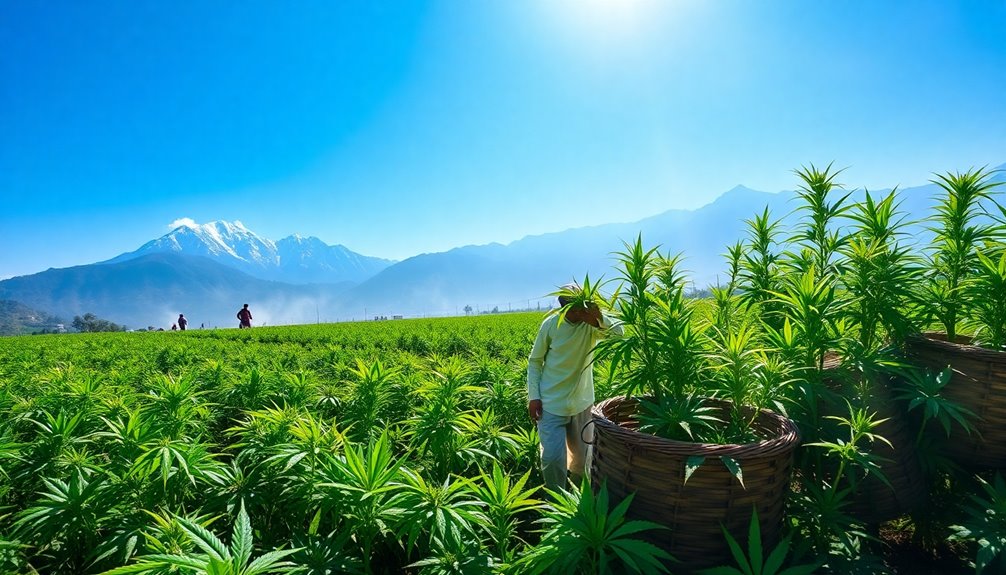Industrial hemp in Nepal holds immense potential for transforming local economies, with suitable land across hilly regions. Cultivating hemp can yield up to $10,450 per hectare, providing higher profits than traditional crops. Legalization could enhance job opportunities, revive cultural practices, and support sustainable agriculture. Plus, hemp offers environmental benefits like soil conservation and carbon sequestration. Imagine the possibilities for rural communities, and there's more to discover about how hemp can enrich Nepal's agricultural landscape.
Key Takeaways
- Industrial hemp cultivation in Nepal is currently illegal, despite 1.8 million hectares of suitable land available for farming.
- Legalization could generate significant income, with profit potential reaching $7,273 per hectare, surpassing many traditional crops.
- Hemp cultivation promotes environmental sustainability through soil conservation, carbon sequestration, and chemical-free farming practices.
- Reviving traditional hemp farming can create job opportunities and enhance rural community livelihoods, fostering local economic resilience.
- Ongoing discussions on legalization present opportunities for market integration and value addition in the hemp industry.

Industrial Hemp in Nepal
Although industrial hemp cultivation is currently illegal in Nepal, its potential for economic and environmental benefits is significant. With about 1.8 million hectares of land suitable for hemp, you can see how this crop could thrive, especially in the hilly regions that account for 71% of that land.
Imagine the boost to local economies if communities could cultivate hemp legally. The prospect of creating jobs in rural areas and increasing local incomes is enticing, particularly given that the cost of producing hemp is around $3,177 per hectare.
The legalization of hemp cultivation could transform rural economies, creating jobs and boosting local incomes significantly.
The potential income from hemp cultivation is impressive, reaching up to $10,450 per hectare. This means you could net about $7,273 per hectare, which outperforms many other crops and even surpasses profits seen in countries like Turkey and the USA. In fact, the profitability of hemp surpasses that of many traditional crops, providing a viable alternative for farmers.
You'd be tapping into a sustainable and profitable alternative that could replace traditional, less lucrative crops. Not only does this provide economic opportunities, but it also represents a return to traditional practices in regions like Darchula and Rolpa, where hemp has been cultivated for generations.
While hemp has a rich history in Nepal, its illegal status poses challenges for developing a formal value chain. If the government were to legalize hemp, you'd find numerous opportunities for value addition and market integration, enhancing economic viability for everyone involved.
Hemp can also support environmental goals by promoting soil conservation, carbon sequestration, and biodiversity. By offering a chemical-free alternative to traditional crops, it could contribute to climate change mitigation as well.
In essence, hemp's multifaceted advantages make it a compelling option for Nepal's future. As the dialogue around legalization continues, you can envision a landscape where hemp not only enriches economies but also nurtures the environment and supports sustainable practices.
Frequently Asked Questions
What Are the Legal Regulations for Growing Industrial Hemp in Nepal?
In Nepal, growing industrial hemp is technically illegal, as it's categorized under cannabis regulations.
You'll find that the Narcotic Drugs Control Act governs this, allowing some use under strict conditions.
While hemp plants grow wild, cultivating them requires special licenses in certain areas.
A proposed Cannabis Cultivation Act aims to clarify regulations and remove licensing for hemp in food and industrial uses, but it's still pending approval.
How Does Industrial Hemp Impact Local Economies in Nepal?
Think of industrial hemp as a golden thread weaving through the fabric of local economies in Nepal.
You'll find it boosting job creation and diversifying agricultural income, giving farmers a stable cash crop. This plant can stimulate rural development, reducing urban migration as communities thrive.
It also opens doors for export potential, allowing you to tap into both local and international markets, enhancing livelihoods and driving economic growth in your area.
What Are the Environmental Benefits of Cultivating Industrial Hemp?
When you cultivate industrial hemp, you're making a positive impact on the environment.
Hemp captures significant CO₂, helping combat climate change. Its fast growth cycle allows for multiple harvests each year, boosting carbon absorption.
Additionally, hemp improves soil health, stabilizes erosion, and promotes fertility. It also requires less water than many crops and reduces the need for harmful pesticides, making it a sustainable choice for both the planet and future agricultural practices.
What Types of Products Can Be Made From Industrial Hemp?
Imagine a world where every product you touch is eco-friendly and sustainable.
With industrial hemp, you can create a variety of amazing items. From durable ropes and stylish clothing to innovative building materials like hempcrete, the possibilities are endless.
You'll find nutritious foods like hemp milk and protein, along with health products such as CBD oils.
Even personal care items benefit from hemp's versatility.
Isn't it exciting to think about all these options?
How Can Farmers Access Training for Industrial Hemp Cultivation in Nepal?
To access training for industrial hemp cultivation in Nepal, you can start by connecting with local agricultural extension services that may offer workshops.
Look into partnerships with universities or international organizations focused on hemp.
Joining community initiatives can also provide informal learning opportunities.
Stay informed about legal frameworks to ensure compliance and seek funding options that support training programs.
Engaging with private sector companies could enhance your understanding of market needs and practices.
Conclusion
In exploring industrial hemp in Nepal, you've discovered its potential to transform local economies and promote sustainable practices. As the saying goes, "Where there's a will, there's a way." With the right initiatives and support, hemp can flourish, benefiting farmers and industries alike. Embracing this versatile crop not only enhances value but also paves the way for a greener future. Let's harness this opportunity and cultivate a thriving hemp industry together!









